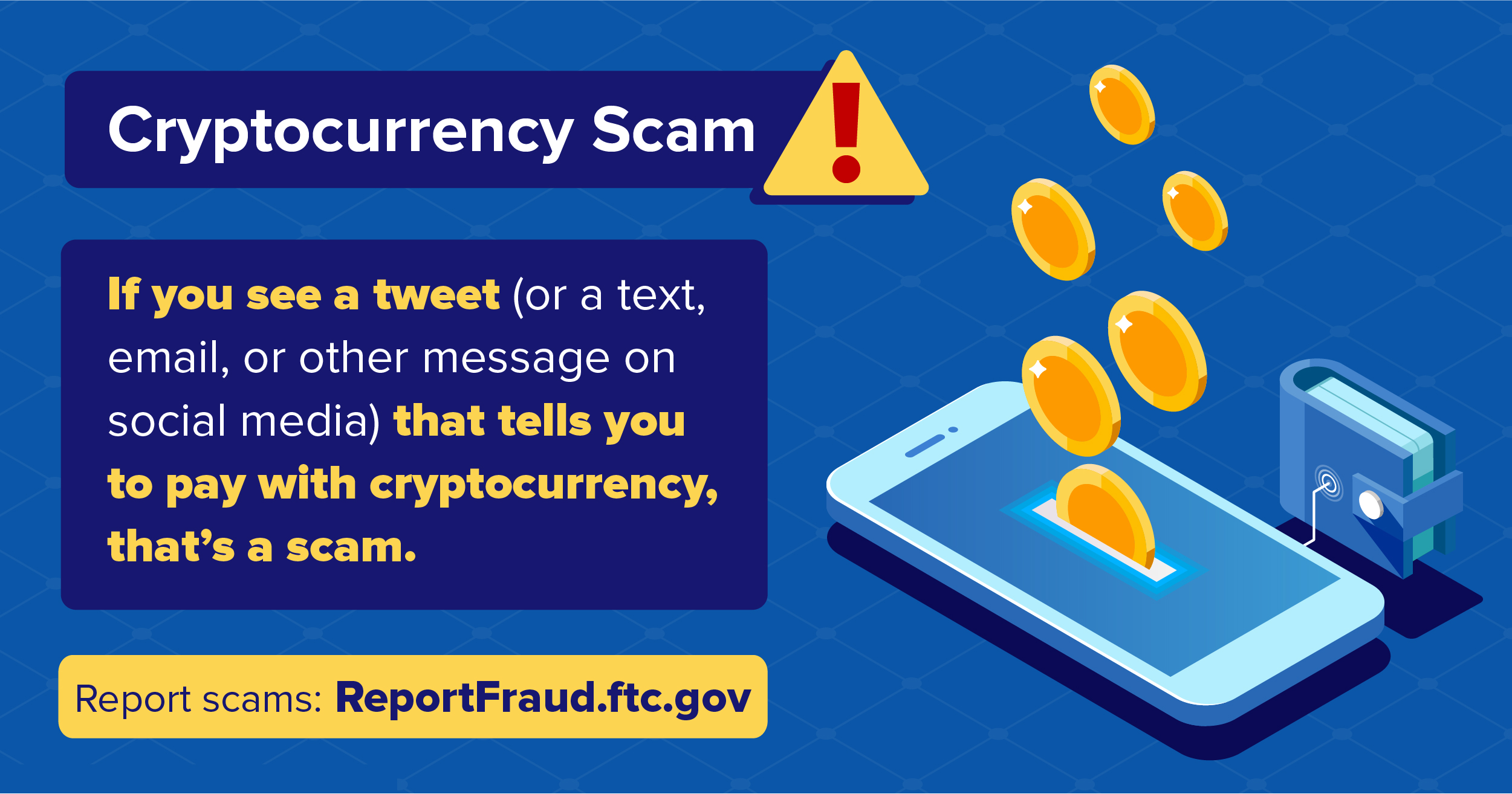What To Know About Cryptocurrency and Scams

- Understanding the basics of cryptocurrency
- Common types of cryptocurrency scams to watch out for
- How to protect yourself from cryptocurrency scams
- Signs that a cryptocurrency investment might be a scam
- Regulatory measures in place to combat cryptocurrency fraud
- Real-life examples of cryptocurrency scams and their impact
Understanding the basics of cryptocurrency
Cryptocurrency is a digital or virtual form of currency that uses cryptography for security. It operates independently of a central authority, such as a government or financial institution. One of the key features of cryptocurrency is its decentralized nature, meaning that it is not controlled by any single entity. Transactions made with cryptocurrency are recorded on a public ledger called a blockchain, which ensures transparency and security.
There are thousands of different cryptocurrencies available in the market, with Bitcoin being the most well-known and widely used. Other popular cryptocurrencies include Ethereum, Ripple, and Litecoin. Each cryptocurrency operates on its own underlying technology and has unique features and use cases.
Investing in cryptocurrency can be lucrative, but it also comes with risks. The value of cryptocurrencies can be highly volatile, with prices fluctuating rapidly. It is essential to understand the basics of cryptocurrency before investing to make informed decisions and mitigate potential risks.
Common types of cryptocurrency scams to watch out for
When it comes to cryptocurrency, scams are unfortunately prevalent in the industry. It is essential to be aware of the common types of cryptocurrency scams to protect yourself from falling victim to fraudulent schemes.
- Phishing scams: Phishing scams involve fraudulent emails, websites, or messages that mimic legitimate sources to trick individuals into providing their sensitive information, such as passwords or private keys.
- Ponzi schemes: Ponzi schemes promise high returns on investments but use funds from new investors to pay returns to earlier investors, creating a cycle of dependency that eventually collapses.
- Initial Coin Offering (ICO) scams: ICO scams involve fraudulent projects that raise funds through an ICO but never intend to deliver on their promises, leaving investors with worthless tokens.
- Exchange scams: Exchange scams occur when cryptocurrency exchanges engage in fraudulent activities, such as misappropriating funds, manipulating prices, or shutting down without warning.
- Wallet scams: Wallet scams involve fake or insecure wallets that trick users into depositing their funds, only to have them stolen by the scammers.
By being aware of these common types of cryptocurrency scams, you can take the necessary precautions to safeguard your investments and avoid falling victim to fraudulent schemes. Remember to always conduct thorough research, verify the legitimacy of projects, and never share your sensitive information with untrusted sources.
How to protect yourself from cryptocurrency scams
When it comes to protecting yourself from cryptocurrency scams, there are several important steps you can take to safeguard your investments. Here are some key tips to keep in mind:
- Research: Before investing in any cryptocurrency, make sure to thoroughly research the project and team behind it. Look for reviews, news articles, and community feedback to get a sense of the legitimacy of the project.
- Use reputable exchanges: Stick to well-known and reputable cryptocurrency exchanges to minimize the risk of falling victim to a scam. Avoid using unknown or unregulated platforms.
- Enable two-factor authentication: Adding an extra layer of security to your accounts with two-factor authentication can help prevent unauthorized access.
- Avoid phishing scams: Be cautious of unsolicited emails, messages, or social media posts asking for your personal information or login credentials. Always verify the source before providing any sensitive information.
- Keep your private keys secure: Your private keys are essentially the keys to your cryptocurrency holdings. Make sure to store them in a secure location and never share them with anyone.
- Stay informed: Stay up to date on the latest cryptocurrency scams and trends in the industry. Being informed can help you spot potential red flags and avoid falling victim to fraudulent schemes.
Signs that a cryptocurrency investment might be a scam
When considering investing in cryptocurrency, it is crucial to be aware of the signs that a potential investment could be a scam. There are several red flags to watch out for that can help you avoid falling victim to fraudulent schemes.
- One common warning sign is promises of guaranteed high returns with little to no risk. If an investment opportunity sounds too good to be true, it probably is.
- Another indication of a possible scam is a lack of transparency or information about the company or individuals behind the cryptocurrency. Legitimate investments should have clear documentation and verifiable credentials.
- Be cautious of pressure tactics or aggressive marketing strategies that push you to invest quickly without giving you time to do your own research. Scammers often try to create a sense of urgency to get you to make impulsive decisions.
- Additionally, be wary of investments that require you to recruit others or participate in a multi-level marketing scheme. These types of setups are often used to disguise Ponzi schemes.
- Lastly, trust your instincts. If something doesn’t feel right or you have doubts about an investment opportunity, it’s better to err on the side of caution and walk away.
Regulatory measures in place to combat cryptocurrency fraud
Regulatory measures are essential in combating cryptocurrency fraud. Governments around the world have implemented various strategies to protect investors and prevent scams in the crypto space. Some of the key regulatory measures in place include:
- Licensing requirements for cryptocurrency exchanges to ensure they comply with anti-money laundering (AML) and know your customer (KYC) regulations.
- Regulatory oversight by financial authorities to monitor and supervise the activities of cryptocurrency businesses.
- Enforcement actions against fraudulent schemes and unregistered offerings to deter bad actors from engaging in illegal activities.
- Collaboration between regulatory agencies and law enforcement to investigate and prosecute cryptocurrency-related crimes.
These regulatory measures aim to create a safer environment for investors and promote trust in the cryptocurrency market. By establishing clear rules and guidelines, regulators can help prevent fraud and protect the integrity of the industry. It is important for individuals to be aware of these regulations and to conduct thorough research before investing in any cryptocurrency to avoid falling victim to scams.
Real-life examples of cryptocurrency scams and their impact
There have been numerous real-life examples of cryptocurrency scams that have had a significant impact on unsuspecting investors. One common type of scam is the Ponzi scheme, where individuals are promised high returns on their investments but are actually paid with the money from new investors. This eventually collapses when there are no more new investors to pay out the returns.
Another prevalent scam is phishing, where scammers create fake websites or emails that mimic legitimate cryptocurrency exchanges or wallets to steal users’ login credentials or private keys. Once scammers have access to this information, they can easily drain victims’ accounts of their funds.
Initial Coin Offering (ICO) scams have also been on the rise, where fraudulent projects raise funds through an ICO and then disappear with investors’ money without delivering on their promises. These scams often prey on the hype surrounding new cryptocurrencies and take advantage of investors’ FOMO (fear of missing out).
One of the most infamous cryptocurrency scams was the case of Bitconnect, a lending and exchange platform that promised investors high returns through a proprietary trading bot. However, it was later revealed to be a Ponzi scheme, resulting in investors losing millions of dollars when the platform shut down.
These examples highlight the importance of conducting thorough research and due diligence before investing in any cryptocurrency project. It is crucial to be wary of promises of guaranteed returns or high profits, as these are often red flags for potential scams. By staying informed and vigilant, investors can protect themselves from falling victim to cryptocurrency scams and mitigate their impact on their finances.



